Amidst a cascade of relentless national crises, a growing number of Lebanese citizens are navigating an unprecedented path to emotional solace: turning to artificial intelligence, particularly platforms like ChatGPT, for critical mental health support.
Lebanon has endured a continuous barrage of catastrophic events over recent years, including the profound 2019 financial collapse that decimated life savings, the devastating 2020 Beirut port explosion, a crumbling public health infrastructure, and ongoing regional conflicts that have displaced thousands. These compounding adversities have inflicted a severe and often unaddressed psychological toll on the population, amplifying collective trauma across generations.
The dire economic situation has rendered professional mental health services largely inaccessible for the majority. With therapy sessions costing between $40 and $100—a sum far beyond the means of many struggling families—and public services remaining scarce, adequate psychological care has become an unaffordable luxury. Clinical psychologists, like Dr. Randa Baraja, confirm a dramatic rise in conditions such as anxiety, depression, and PTSD, alongside a disturbing trend of individuals seeking emotional refuge in AI tools due to the systemic lack of conventional support.
One poignant example is Zainab Dhaher, a 34-year-old mother displaced by conflict. Facing overwhelming psychological wounds and unable to afford professional help, she sought solace in ChatGPT after a social media recommendation. The AI’s alarming preliminary diagnoses, including PTSD and schizophrenia, underscored the desperate need for support but also highlighted the potential pitfalls of unsupervised AI therapy.
However, Zainab’s initial reliance on ChatGPT support soon morphed into frustration. Despite the AI’s immediate availability, its responses felt “hollow” and ultimately proved unsatisfying, leaving her with a sense of “shouting into a void.” This experience illustrates the profound limitations of algorithmic solutions in addressing complex human psychological trauma, emphasizing that AI cannot genuinely replicate the nuanced empathy and therapeutic understanding of a trained professional.
The Lebanon crisis continues to amplify mental health challenges, with economic despair exacerbating the psychological impact of conflict. The drastic devaluation of the Lebanese lira has plunged many into poverty, making even basic necessities a struggle, let alone the specialized care required for deep-seated emotional distress. Young people, already grappling with political disillusionment and economic uncertainty, have been particularly affected.
In response to this urgent need, humanitarian organizations and the Ministry of Health have launched initiatives like free, confidential mental health applications designed by clinical psychologists, aiming to provide accessible alternatives. Yet, experts like Siba Haidar Ahmed caution against misinterpreting AI interactions as legitimate therapy, underscoring the vital distinction between informational assistance and comprehensive mental health intervention required for true digital well-being.
As many Lebanese families strive to rebuild their lives in the aftermath of sustained hardship, the path to psychological recovery remains fraught with challenges. The enduring scars of conflict and economic instability persist, pushing individuals to seek comfort and answers in algorithms. For many, like Zainab, the war may have physically ended, but its profound psychological impact continues to resonate deeply within their lives, necessitating comprehensive and accessible mental health solutions.






Leave a Reply